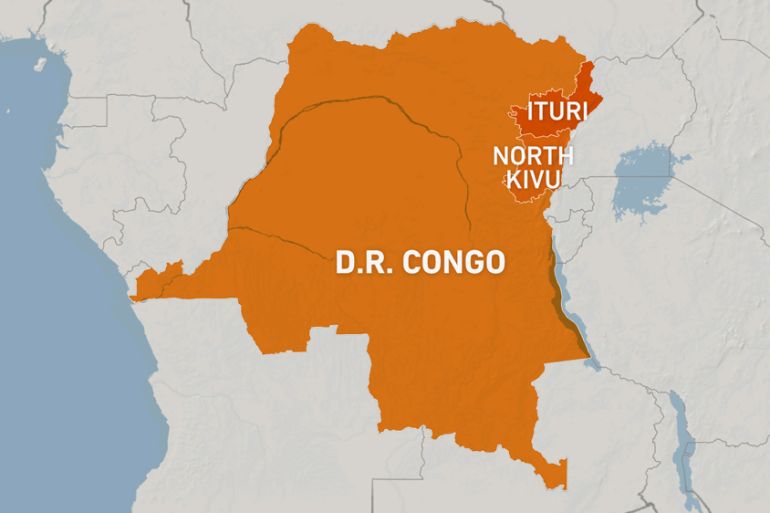Sixteen civilians killed in overnight eastern DRC village attacks
More than a dozen people also reported missing after the latest North Kivu attack blamed on the Allied Democratic Forces armed group.

Attackers have killed at least 16 civilians in three villages, according to a monitoring group, in the latest attacks to hit the troubled east of the Democratic Republic of the Congo (DRC).
The Kivu Security Tracker, which maps violence in the region, said on Thursday the killings occurred overnight in the villages of Mayele, Kalembo and Toya in the Beni region of the North Kivu province.
“The ADF is suspected,” the group added on Twitter, referring to the Allied Democratic Forces (ADF) armed group, which has long been active along the DRC’s eastern border.
At least 16 civilians were killed last night in the villages of Mayele, #Kalembo and Toya (#Beni territory, North#Kivu). The #ADF are suspected. At least 944 civilians have been killed in North Kivu and #Ituri since the state of siege was established on May 6. #DRC pic.twitter.com/xHTMQ98vbR
— Baromètre sécuritaire du Kivu (@KivuSecurity) October 21, 2021
Separately, civil society coordinator Maleki Mulala told AFP news agency the death toll was as high as 18, with more than a dozen people missing.
He said four women were among those who were shot dead, accusing the army of failing to pursue the attackers.
However, Captain Antony Mualushayi, army spokesman for the Beni region said soldiers had clashed with a group of “terrorists”, including ADF fighters in the area.
The Kivu Security Tracker lists the killings of 944 civilians in North Kivu and neighbouring Ituri province since May when a “state of siege”, under which senior civilian posts were taken over by military or police officers, was declared to try to quell the dozens of armed groups that have been roaming the region for more than a quarter of a century.
Last month, MONUSCO, the United Nations’ peacekeeping mission, reported that summary killings in eastern DRC surged in August, driven by rebel groups but also the armed forces.
It said 739 cases of breach of human rights were recorded that month, compared with 492 in July.
“Agents of the state” accounted for nearly 55 percent of the cases, including the extrajudicial killings of at least 40 civilians, it said. Armed groups were responsible for the other 45 percent of recorded abuses, although the number of killings attributed to them – at least 253 – was far higher.
The UN’s Joint Human Rights Office (UNJHRO) at the time said the “state of siege” had enabled “some improvements in the security situation” but “many challenges remain”.
UNJHRO chief Abdoul Aziz Thioye further noted “a new tendency” that had emerged with the ADF, which was sharpening old disputes between ethnic communities by teaming up with one group against the other.
When the armed forces attack the ADF, the group responds by dispersing into small units and extending into a wider area, he said.
“The threat is very complex,” added Thioye.